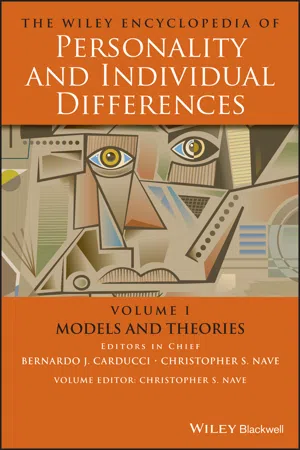
- English
- ePUB (mobile friendly)
- Available on iOS & Android
About this book
Volume 1, Models and Theories of The Wiley Encyclopedia of Personality and Individual Differences
The Encyclopedia of Personality and Individual Differences (EPID) is organized into four volumes that look at the many likenesses and differences between individuals. Each of these four volumes focuses on a major content area in the study of personality psychology and individuals' differences. The first volume, Models and Theories, surveys the significant classic and contemporary viewpoints, perspectives, models, and theoretical approaches to the study of personality and individuals' differences (PID). The second volume on Measurement and Assessment examines key classic and modern methods and techniques of assessment in the study of PID. Volume III, titled Personality Processes and Individuals Differences, covers the important traditional and current dimensions, constructs, and traits in the study of PID. The final volume discusses three major categories: clinical contributions, applied research, and cross-cultural considerations, and touches on topics such as culture and identity, multicultural identities, cross-cultural examinations of trait structures and personality processes, and more.
- Each volume contains approximately 100 entries on personality and individual differences written by a diverse international panel of leading psychologists
- Covers significant classic and contemporary personality psychology models and theories, measurement and assessment techniques, personality processes and individuals differences, and research
- Provides a comprehensive and in-depth overview of the field of personality psychology
The Encyclopedia of Personality and Individual Differences is an important resource for all psychology students and professionals engaging in the study and research of personality.
Frequently asked questions
- Essential is ideal for learners and professionals who enjoy exploring a wide range of subjects. Access the Essential Library with 800,000+ trusted titles and best-sellers across business, personal growth, and the humanities. Includes unlimited reading time and Standard Read Aloud voice.
- Complete: Perfect for advanced learners and researchers needing full, unrestricted access. Unlock 1.4M+ books across hundreds of subjects, including academic and specialized titles. The Complete Plan also includes advanced features like Premium Read Aloud and Research Assistant.
Please note we cannot support devices running on iOS 13 and Android 7 or earlier. Learn more about using the app.
Information
Index
a
- ABEPP. See American Board of Examiners in Professional Psychology
- Abma, T. A. 365
- Abraham, Karl 67
- accuracy, theory of 393–5. See also Realistic Accuracy Model
- acquaintanceship effect 345
- active listening, in individual psychology 114
- actual self 69
- adaptation
- environmental, Cattell’s trait theory lexical analysis and 137
- hedonic, of SWB 40, 358
- observable phenomena of motivational control and resourceful adaptation 18
- adaptations
- characteristic, McAdams on 83, 85, 288–9
- evolutionary psychology and 186, 209
- phenotypes and 186
- positive, resilience and 357–9
- ADHD, frequency-dependent selection and 192
- Adler, Alfred, individual psychology of 111–14
- affection, as neurotic trend 68
- affective channel, for self-efficacy 377
- affectothymia-sizothymia (warm-cool orientation), Cattell’s trait theory lexical analysis and 137
- age-based rejection sensitivity 353
- Age Differences in Personality Structure (Costa and McCrae) 26
- agency
- interpersonal circumplex and 141–5
- McAdams and 84
- aggression
- in animal personalities 117–18, 119, 121
- Baumeister on 14
- deindividuation and 3...
Table of contents
- Cover
- Table of Contents
- Title Page
- Copyright Page
- Contributor Biographies
- Gordon Allport
- Roy F. Baumeister
- Jack Block
- David M. Buss
- Paul T. Costa Jr.
- Robert McCrae
- Ed Diener
- Erik H. Erikson
- Hans J. Eysenck
- David Funder
- Lewis R. Goldberg
- Karen Horney
- Carl Jung
- Abraham H. Maslow
- Dan McAdams
- Walter Mischel
- Carl Rogers
- George Kelly
- Agreeableness
- Individual Psychology of Alfred Adler
- Animal Personalities
- Conscientiousness
- Cognitive‐Affective Processing System (CAPS)
- Cattell Trait Theory Lexical Analysis
- Interpersonal Circumplex
- Psychodynamic Perspective of Defense Mechanisms
- Delay of Gratification
- Extraversion – Introversion
- Ego Control/Ego Resiliency Theory (ARCH)
- Emotional Intelligence
- Erikson’s Stages of Psychosocial Development
- Evolutionary Theory of Personality
- Psychoticism
- Five Factor Model, Facets of
- Gender Differences in Personality, Evolutionary Perspective on
- Contemporary Theories of Gender Identity
- Gene‐environment Interaction
- Goldberg vs Costa/McCrae Five Factors
- Grit
- Hedonic Adaptation
- Heritability
- HEXACO Model of Personality
- Independent/Interdependent Self
- Personal Construct Theory of George A. Kelly
- Maslow’s Hierarchy of Needs
- Meaning in Life
- Neuroticism
- Narrative Approach
- Openness
- Optimism/Pessimism Carver and Scheier Theory
- Personal Projects
- Personality and Language
- Personality Stability and Change over Time
- Personality in Culture
- Personality Stability over Time
- Priming
- Realistic Accuracy Model
- Rejection Sensitivity
- Resilience Theory of, Not Just the Trait Dimension
- Schemas, Theory of
- Self‐Determination Theory
- Self‐efficacy Theory
- Self‐esteem, Theory of
- Self‐Monitoring, Theory of
- Self‐other Interjudge Agreement; Theory of Accuracy
- Self‐Presentation Theory/Impression Management
- Social Learning Theory/Social Cognitive Theory
- Terror Management Theory
- Trait Theory of Allport
- Whole Trait Theory
- Index
- End User License Agreement